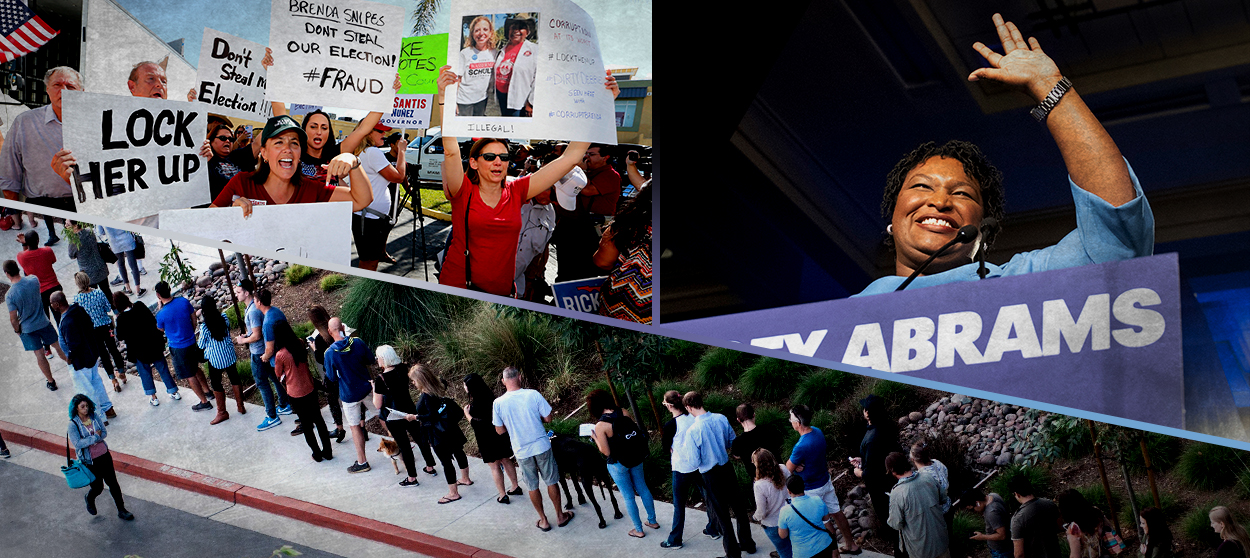America's elections are broken. Here's how to fix them.
A bipartisan plan


A free daily email with the biggest news stories of the day – and the best features from TheWeek.com
You are now subscribed
Your newsletter sign-up was successful
The American electoral system is a mess.
Well over a week after Election Day, multiple states are still counting ballots, while the president makes baseless and dangerous accusations of fraud to try to stop them. Even worse some voters waited in long lines for hours at the polls while others likely were disenfranchised altogether.
Maybe worst of all: We're patting ourselves on the back for the highest midterm turnout in more than a century, but it still may not reach 50 percent.
The Week
Escape your echo chamber. Get the facts behind the news, plus analysis from multiple perspectives.

Sign up for The Week's Free Newsletters
From our morning news briefing to a weekly Good News Newsletter, get the best of The Week delivered directly to your inbox.
From our morning news briefing to a weekly Good News Newsletter, get the best of The Week delivered directly to your inbox.
We need a fairer system designed to ensure that all Americans can vote. Thankfully, such a system is eminently achievable and would offer something for every American to like.
The first step in building a better voting system is to standardize the process. To avoid any constitutional questions tied to state versus federal power, the federal government should employ the common practice of offering states significant funding to adopt a uniform electoral scheme.
The starting point for a new system ought to be adopting automatic voter registration, as well as same day and online registration. These systems compliment each other. The former, already adopted by 15 states and the District of Columbia, automatically registers any voter who renews or obtains a driver's license or other state ID unless the person opts out. States that have adopted this policy have seen voter registration rates skyrocket.
But because automatic registration doesn't cover Americans who would have no reason to obtain such state IDs (and there are some), the government should also push online and same day registration. Already available in 18 states and the District of Columbia, same day registration has proven to increase turnout, and no American adult who decides to vote should be turned away because he or she has not mailed in a registration form or moves after a deadline.
A free daily email with the biggest news stories of the day – and the best features from TheWeek.com
Indeed, the guiding principle of the new system ought to be that voting is a sacred right — one protected by the Voting Rights Act, as well as the 15th Amendment. It should not be infringed upon by requirements claiming to prevent fraud, but in reality simply creating obstacles to exercising the franchise, especially for marginalized populations.
That means eliminating burdensome provisions like Georgia's "exact match" law that requires "citizens' names on their government-issued IDs" to "precisely match their names as listed on the voter rolls." Such stringent requirements do little to safeguard electoral security, but instead inconvenience or disenfranchise newly weds, people who might have a middle name on an ID, but forget to use it when registering to vote, and even voters who list a name with a hyphen on one piece of paperwork, but later drop the hyphen.
All of these changes will likely turn off Republicans and please Democrats. But for legislation to be possible in our polarized climate, Republicans must get something as well: dramatically reduced mail voting and the elimination of super early voting.
Undoubtedly, mail ballots make voting easier and boost turnout. Nonetheless, Republicans have shown their dislike of mail balloting as they've fought to strictly interpret provisions that would disqualify mail ballots in Florida and Georgia. Democrats should be willing to trade limits on the practice for other reforms that would also achieve its' primary goal — enhanced access to the ballot.
Republicans have also worked to limit early voting, while Democrats clamor for more of it. On this issue, a natural compromise exists — one that benefits democracy. Americans are not well served by having people vote weeks apart from one another. What we know about candidates frequently changes in the crucible of a campaign. Having people vote weeks apart therefore often means voting with fundamentally different understandings of the candidates. That's bad for democracy.
Yet, the idea of one Election Day also serves us poorly in an America where people travel, work 12 hour (or more) shifts, and face other impediments to getting to the polls — which can range from medical emergencies, to giving birth, to an unexpectedly sick child.
The fairest balance is to replace Election Day with Election Week.
This period would actually last for 11 days — shorter than voting in states with extensive early voting and mail balloting, but far longer than the 13 states with no early voting — beginning on a Saturday and ending on a Tuesday to adhere to our Election Day tradition. A full array of polling places would be open during the two weekends of voting, making it easier for people who work during the week to vote. This voting period would also likely reduce congestion — and long lines — at the polls. Less chaos and shorter lines would lead to fewer errors by poll workers, less rushing in the voting booth, and a smoother voting experience. The narrowness of the period also would allow for enormous hype and media attention, which will help drive voters to the polls.
Limited mail voting would necessarily remain an option for those who are infirm, immobile, or otherwise absolutely cannot get to a polling place (like a college student who is away at school).
At the polls, every American should vote on machines that produce paper backups or records. This provides security against something going awry. Voting on machines speeds up the count and removes suspicion about post election counting chicanery, but it must be done in a safe, verified, and hack-proof way.
Such a system would be expensive — more days with polling places open and new machines cost more money — and the federal government should step forward to fund it. It would also require Americans to step to the plate and volunteer to be poll workers.
But this system would dramatically reduce impediments to voting. It would also be fairer to all Americans because everyone would vote using the same system at the same basic time. These should be the goals of our electoral system — fairness and ease of use — and they are readily achievable if we prioritize them.
Brian Rosenwald is a Resident Senior Fellow at the Robert A. Fox Leadership Program at the University of Pennsylvania, co-editor of Made by History at the Washington Post, and author of Talk Radio's America, forthcoming from Harvard University Press in 2019.
-
 How to Get to Heaven from Belfast: a ‘highly entertaining ride’
How to Get to Heaven from Belfast: a ‘highly entertaining ride’The Week Recommends Mystery-comedy from the creator of Derry Girls should be ‘your new binge-watch’
-
 The 8 best TV shows of the 1960s
The 8 best TV shows of the 1960sThe standout shows of this decade take viewers from outer space to the Wild West
-
 Microdramas are booming
Microdramas are boomingUnder the radar Scroll to watch a whole movie
-
 The billionaires’ wealth tax: a catastrophe for California?
The billionaires’ wealth tax: a catastrophe for California?Talking Point Peter Thiel and Larry Page preparing to change state residency
-
 Bari Weiss’ ‘60 Minutes’ scandal is about more than one report
Bari Weiss’ ‘60 Minutes’ scandal is about more than one reportIN THE SPOTLIGHT By blocking an approved segment on a controversial prison holding US deportees in El Salvador, the editor-in-chief of CBS News has become the main story
-
 Has Zohran Mamdani shown the Democrats how to win again?
Has Zohran Mamdani shown the Democrats how to win again?Today’s Big Question New York City mayoral election touted as victory for left-wing populists but moderate centrist wins elsewhere present more complex path for Democratic Party
-
 Millions turn out for anti-Trump ‘No Kings’ rallies
Millions turn out for anti-Trump ‘No Kings’ ralliesSpeed Read An estimated 7 million people participated, 2 million more than at the first ‘No Kings’ protest in June
-
 Ghislaine Maxwell: angling for a Trump pardon
Ghislaine Maxwell: angling for a Trump pardonTalking Point Convicted sex trafficker's testimony could shed new light on president's links to Jeffrey Epstein
-
 The last words and final moments of 40 presidents
The last words and final moments of 40 presidentsThe Explainer Some are eloquent quotes worthy of the holders of the highest office in the nation, and others... aren't
-
 The JFK files: the truth at last?
The JFK files: the truth at last?In The Spotlight More than 64,000 previously classified documents relating the 1963 assassination of John F. Kennedy have been released by the Trump administration
-
 'Seriously, not literally': how should the world take Donald Trump?
'Seriously, not literally': how should the world take Donald Trump?Today's big question White House rhetoric and reality look likely to become increasingly blurred
